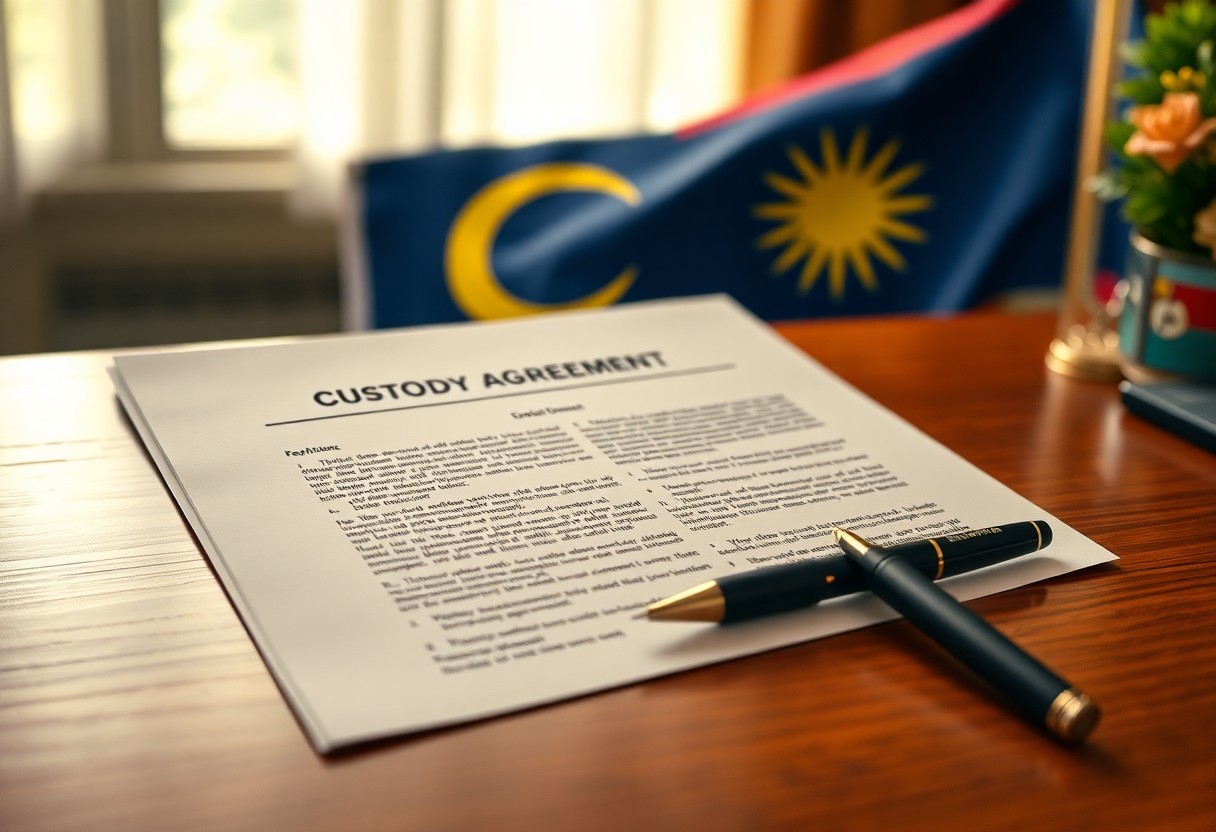It’s important for you to understand the legal landscape regarding custody in Malaysia as a father. While fathers can obtain full custody under certain circumstances, the process often emphasizes the best interests of the child. Factors like financial stability, the child’s well-being, and parental involvement significantly influence custody decisions. Knowing your rights and the legal framework can enhance your chances of securing full custody, ensuring you can provide the necessary care and support for your child.

Key Takeaways:
- Fathers can obtain full custody in Malaysia, but it is less common than mothers.
- The court prioritizes the child’s best interests when making custody decisions.
- Evidence of a father’s capability to provide a stable environment is vital.
- Factors considered include the child’s age, needs, relationship with each parent, and living conditions.
- Joint custody arrangements are often favored, allowing both parents to be involved.
- Legal advice and representation can enhance a father’s chances in custody cases.
- Custody outcomes may vary between different jurisdictions within Malaysia.
The Legal Framework: Custody Laws in Malaysia
Understanding the custody laws in Malaysia is vital, especially as they cover various aspects of parental rights and responsibilities. The legal framework is informed by both statutory laws and the Islamic Family Law for Muslim parents, which outlines how custody decisions are made in the best interests of the child. Different states may have variations in their regulations, but the fundamental principles remain consistent across the country.
Key Statutes Governing Child Custody
The primary statutes influencing child custody in Malaysia include the Guardianship of Infants Act 1961 and the Islamic Family Law (Federal Territories Act) 1984. These laws set the groundwork for how custody arrangements are determined, emphasizing factors like the child’s welfare and parental capabilities. Additionally, the Civil Law Act 1956 also plays a role in non-Muslim custody cases, providing a framework for resolving disputes.
Court Discretion and Decision-Making Factors
Courts possess substantial discretion in custody cases, making decisions based on various factors aimed at the welfare of the child. Factors such as parental ability, stability, and the child’s emotional ties with each parent are considered, along with input from child welfare experts when necessary. The court’s focus is not solely on the biological relationship but also on the overall nurturing environment each parent can provide. This discretion allows for case-by-case evaluations, resulting in decisions tailored to each unique situation.
- Court Discretion
- Child Welfare
- Parental Ability
- Emotional Ties
- Nurturing Environment
- Case-by-Case Evaluations
- Best Interests of the Child
Courts are guided by the principle of the best interests of the child, considering various facts and opinions before reaching their decision. This includes assessing the child’s emotional and psychological needs, the ability of each parent to provide for them, and the living conditions each parent can offer. The court may also appoint a child psychologist or family mediator to gather unbiased insights. This tailored approach underlines the importance of present circumstances over mere formalities.
- Best Interests of the Child
- Child Psychologist
- Family Mediator
- Living Conditions
- Emotional and Psychological Needs
- Unbiased Insights
Fathers’ Rights: Navigating Perceptions and Bias
In Malaysia, navigating the landscape of father’s rights involves confronting entrenched perceptions and biases regarding parenting roles. Your capability and commitment as a father might be overshadowed by societal norms that traditionally prioritize mothers in custody matters. This often complicates legal proceedings, forcing you to proactively challenge these assumptions and advocate for your rights effectively.
Societal Assumptions About Parenting Roles
Common societal assumptions dictate that mothers are naturally more suited for caregiving, which can impact custody decisions. These stereotypes can lead to an automatic preference for mothers in custody disputes, putting you in a position where you must demonstrate your parental abilities consistently. Shifting these perceptions requires you to showcase your involvement and commitment to your children actively.
The Impact of Stereotypes on Custody Outcomes
Stereotypes surrounding fatherhood can significantly influence custody outcomes in Malaysian courts. Biases may lead judges to underestimate your parenting skills or question your intentions. Documenting your active participation in your child’s life and highlighting your support network can counteract these negative perceptions. Ultimately, demonstrating your capacity as a nurturing and responsible parent is key to improving your chances for custody.
|
|
|
|
|
|
|
|
|
|
Addressing stereotypes about fathers as primary caregivers influences custody decisions. Studies indicate that fathers who engage actively in their children’s lives often experience more favorable outcomes in custody arrangements. Legal challenges can arise when courts favor conventional mother-centric roles. Proactively sharing evidence of your parenting skills through records of involvement, educational activities, and persistent presence can mitigate biases against you. The landscape of custody can be navigated more successfully by dismantling stereotypes and presenting yourself as a committed guardian.
|
|
|
|
|
|
|
|
|
|

Proving Your Case: Essential Considerations for Fathers
To secure full custody, you must present a compelling case that highlights both your commitment as a father and the environment you can provide for your child. Gathering the right documentation, demonstrating your active role in daily life, and showing how custody aligns with your child’s best interests will form the foundation of your argument. Understanding the legal requirements and navigating the complex custody landscape in Malaysia is vital for maximizing your chances.
Documenting Involvement and Stability
Establishing your involvement in your child’s life is crucial. This includes providing records of participation in school events, medical appointments, and daily routines that showcase your stability and commitment. Detailed logs of your interactions, including emails and messages with teachers or caregivers, can strengthen your case by illustrating an engaged and nurturing parent-child relationship.
Demonstrating Best Interests of the Child
Proving that your custody aligns with the best interests of the child involves showing how their emotional, physical, and educational needs can be met. Evidence like testimonials from teachers or family members can support your claims. Highlighting a safe and stable living environment, along with your readiness to participate in co-curricular and developmental activities, reinforces your position as the ideal custodian.
While demonstrating the best interests of the child, you must articulate specific aspects of their life that you can enhance as a full-time caregiver. For instance, your proximity to quality schools, access to extracurricular activities, and a secure home environment all contribute to a nurturing setting. Furthermore, fostering strong relationships with extended family members or being involved in the community can illustrate your capability to provide not just a home, but a thriving environment for your child. Judges often favor the parent who not only promises stability but demonstrates an ongoing commitment to the child’s comprehensive well-being.

Seeking Legal Guidance: Steps for Fathers Pursuing Custody
Engaging a qualified attorney specializing in family law can significantly enhance your chances of obtaining custody. Start by researching local lawyers with experience in custody cases, ensuring they understand the nuances of Malaysian law. An initial consultation often reveals necessary insights and options tailored to your situation. Be prepared to discuss your goals and gather all relevant documentation, which aids in building a strong case for your custody application.
Finding the Right Legal Representation
Choosing the right lawyer is a foundational step in your custody journey. Look for attorneys with a strong track record in custody disputes. They should be familiar with various legal strategies that can effectively highlight your parenting strengths. Personal referrals or online reviews can guide you towards reputable professionals who genuinely prioritize your family’s needs.
Preparing for Court: What to Expect
Being adequately prepared for court can influence the outcome of your custody case. Understand the basic court procedures and anticipate questions or topics that may arise. During the trial, you and your attorney will present evidence and testimonies to support your claim for custody. Familiarize yourself with the proceedings to reduce anxiety and ensure you communicate effectively.
The preparation process involves organizing all necessary documentation, including financial statements, character references, and a proposed parenting plan. You should rehearse how to articulate your case clearly, focusing on what is in the best interests of your child. Courts often assess emotional stability, parental involvement, and your child’s overall environment, so strategizing your answers ahead of time can give you an edge.
The Path Forward: Encouraging Change in Custody Perceptions
Shifting societal views on parental roles plays a vital role in fostering a more equitable custody framework in Malaysia. As fathers increasingly advocate for their parenting rights, cultural norms that traditionally favor mothers must be actively challenged. Media representation of fatherhood as equally nurturing can help reshape perceptions, while community support fosters an environment where shared parenting is the norm, benefiting children and parents alike.
Advocacy for Equitable Custody Laws
Advocating for laws that promote gender-neutral custody arrangements is necessary for fostering fairness in family courts. Legislative reform can dismantle stereotypes that prioritize maternal rights over paternal involvement. Engaging with grassroots organizations and policymaking bodies ensures that fathers’ interests are represented, leading to a legal framework that prioritizes the best interests of the child irrespective of gender.
Supporting Fathers in Custody Battles
When facing custody disputes, establishing a support network can significantly enhance your chances of success. Connecting with support groups or online forums can provide emotional backing and practical advice from others who have navigated similar challenges. Tailored resources, including counseling and legal aid, can help you overcome obstacles in custody battles and strengthen your position in court.
Support systems specifically geared towards fathers navigating custody battles are vital for emotional resilience and informed decision-making. Resources such as local support groups or online forums like Fathers4Justice can connect you with others who share experiences and strategies. Accessing legal guidance ensures you stay updated on changes in the law, while therapy or counseling can help manage stress as you pursue your rights. Engaging with community organizations dedicated to paternal advocacy amplifies your voice and provides necessary tools to navigate this complex landscape.
Summing up
So, in Malaysia, fathers can obtain full custody of their children, but it largely depends on the specific circumstances of each case. You should understand that the court prioritizes the child’s best interests, taking into account factors like the child’s welfare, your ability to provide a stable environment, and any history of parental involvement. Being informed about legal procedures and seeking professional advice can enhance your chances of securing custody. Always approach the situation with a clear focus on what is best for your child.
FAQ
Q: Can fathers obtain full custody of their children in Malaysia?
A: Yes, fathers can obtain full custody of their children in Malaysia, although it may be more challenging than for mothers.
Q: What factors do Malaysian courts consider when deciding custody cases?
A: Courts consider the best interests of the child, the parents’ ability to provide for the child’s wellbeing, the child’s emotional needs, and the existing bond between the parent and child.
Q: Is there a preference for mothers over fathers in custody cases?
A: Traditionally, there has been a preference for mothers, especially for younger children, but recent legal trends show that courts are increasingly recognizing fathers’ rights.
Q: What steps should a father take to apply for full custody?
A: A father should gather evidence of his capability to care for the child, file a custody application in the relevant court, and attend all hearings to present his case.
Q: Are there specific legal requirements for fathers seeking full custody?
A: Yes, fathers must comply with legal requirements such as proving their ability to provide a stable environment and demonstrating that granting them custody serves the child’s best interests.
Q: Can fathers challenge an existing custody order?
A: Yes, fathers can file for a variation of an existing custody order if there has been a significant change in circumstances affecting the child’s welfare.
Q: What resources are available for fathers in custody disputes?
A: Fathers can seek assistance from family law attorneys, support groups, and various non-governmental organizations that focus on fathers’ rights.
